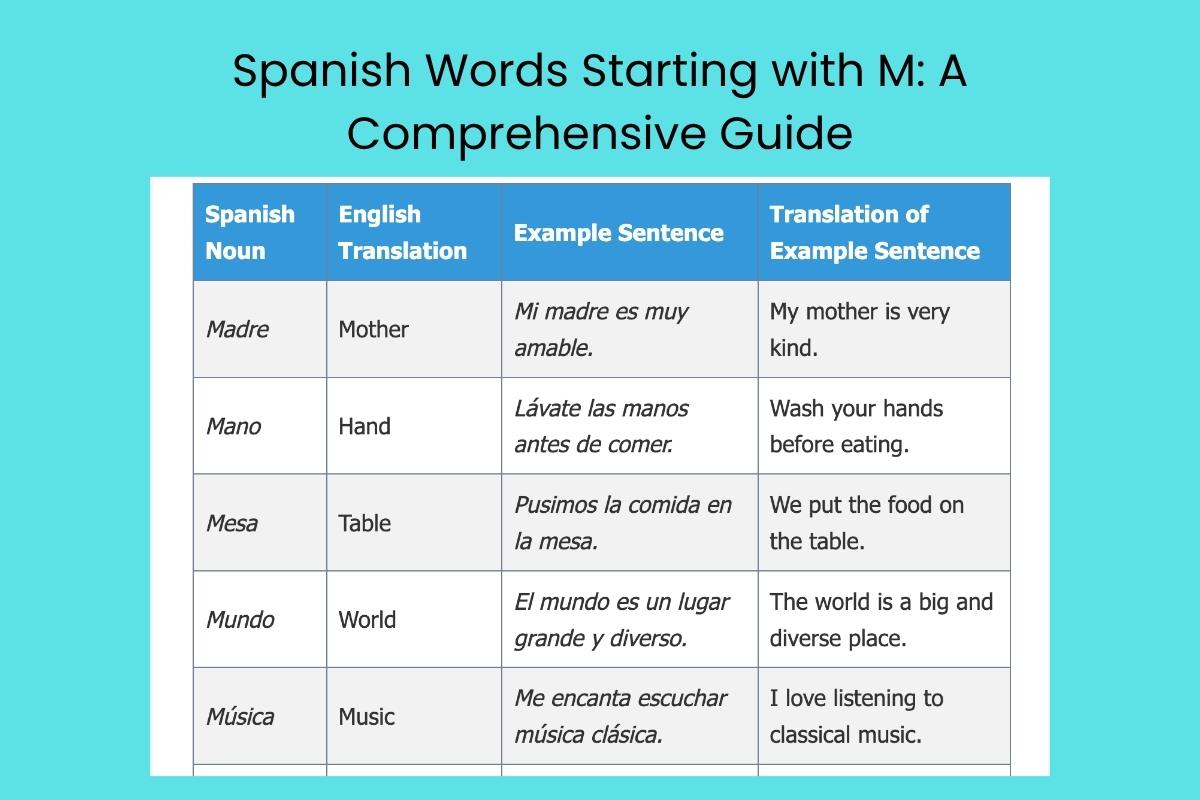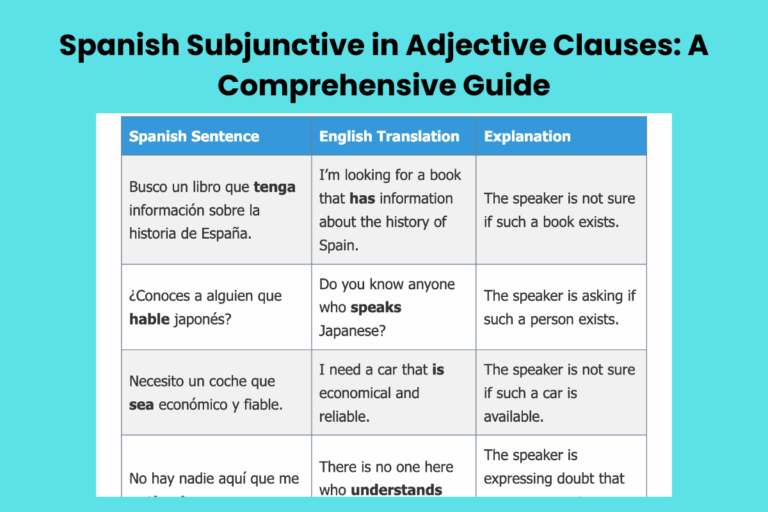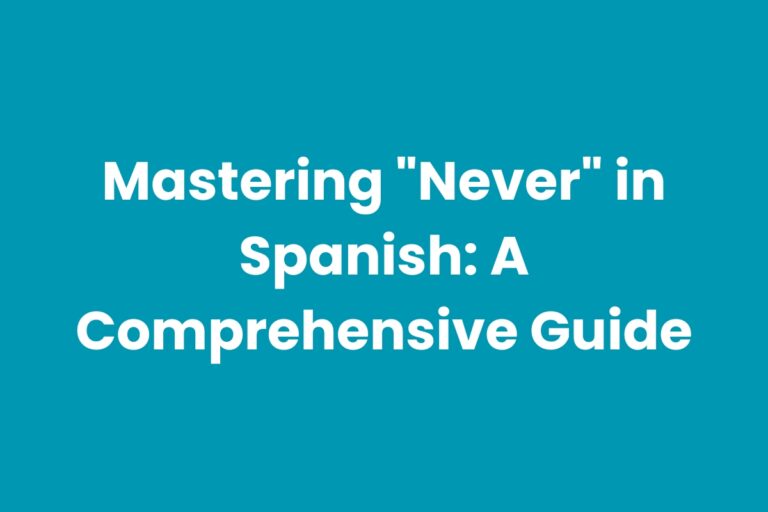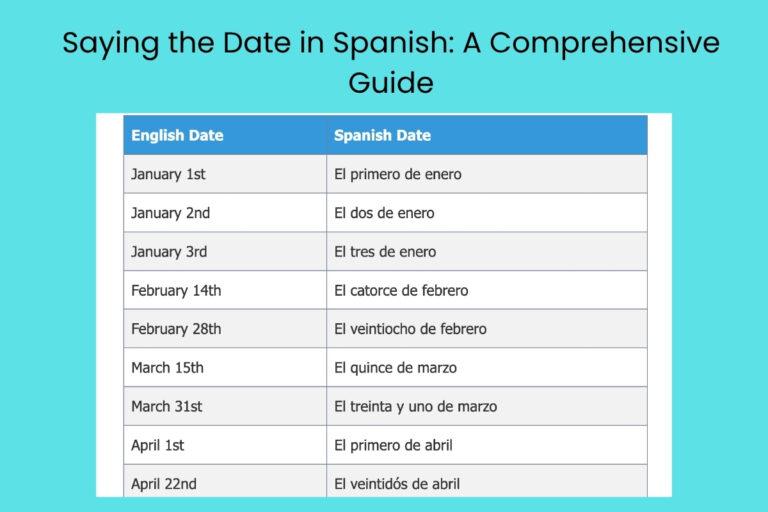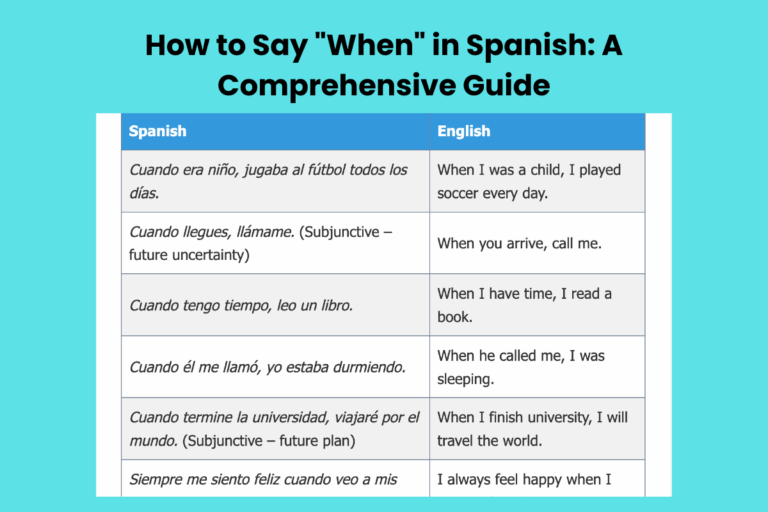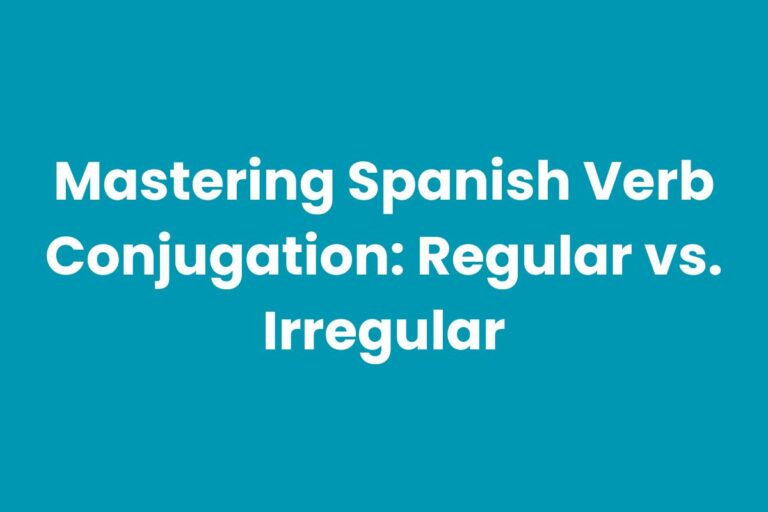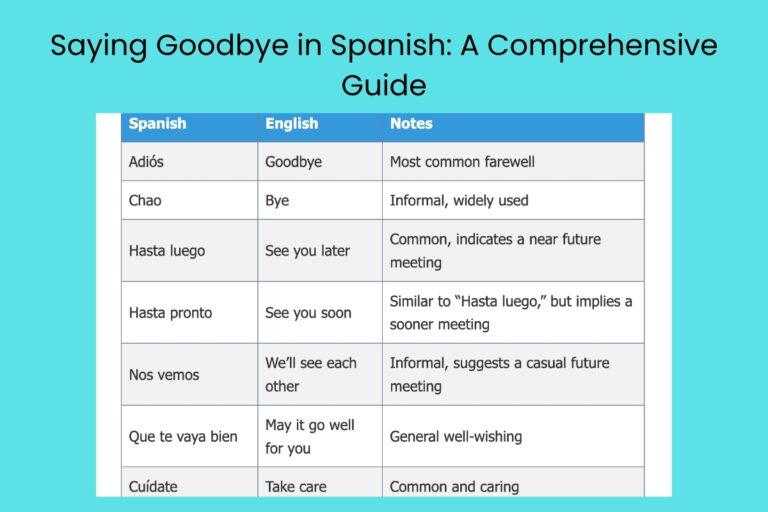Spanish Words Starting with M: A Comprehensive Guide
Mastering vocabulary is crucial for fluency in any language, and Spanish is no exception. Understanding words that begin with specific letters can improve recall, comprehension, and overall communication skills.
This article provides a comprehensive guide to Spanish words starting with the letter “m,” exploring their meanings, usage, and grammatical contexts. Whether you’re a beginner or an advanced learner, this resource will enhance your understanding and application of Spanish vocabulary, leading to more confident and effective communication.
Table of Contents
- Introduction
- Definition of Spanish Words Starting with ‘M’
- Structural Breakdown of Spanish Words
- Types and Categories of ‘M’ Words
- Examples of Spanish Words Starting with ‘M’
- Usage Rules for Spanish Words Starting with ‘M’
- Common Mistakes with ‘M’ Words
- Practice Exercises
- Advanced Topics
- FAQ
- Conclusion
Introduction
Expanding your Spanish vocabulary is essential for achieving fluency and confidence in communication. Focusing on words that begin with a specific letter, such as “m,” allows for targeted learning and improved retention.
This article offers a structured approach to understanding and using Spanish words that start with “m,” providing definitions, examples, usage rules, and practice exercises. This resource is designed for Spanish learners of all levels, from beginners seeking to build a foundational vocabulary to advanced speakers aiming to refine their language skills.
Definition of Spanish Words Starting with ‘M’
Spanish words starting with the letter “m” encompass a diverse range of meanings and grammatical functions. They can be nouns, verbs, adjectives, or adverbs, each playing a unique role in constructing sentences and conveying ideas.
Understanding the definition of each word is the first step in mastering its usage. The letter ‘m’ itself doesn’t carry any specific grammatical significance; its role is purely phonetic in the construction of words.
Classifying these words by their grammatical function helps to understand how they operate within a sentence. Nouns, such as mesa (table) or madre (mother), name people, places, things, or ideas. Verbs, like mirar (to look) or mover (to move), express actions or states of being. Adjectives, such as malo (bad) or maduro (mature), describe nouns. Adverbs, like más (more) or muy (very), modify verbs, adjectives, or other adverbs.
Structural Breakdown of Spanish Words
Spanish words, including those starting with “m,” are built from morphemes, the smallest units of meaning. These morphemes can be prefixes, suffixes, or root words. Understanding how these elements combine can help decipher the meaning of unfamiliar words. For example, the word movimiento (movement) is derived from the verb mover (to move) with the addition of the suffix “-miento,” which often indicates an action or process.
Many Spanish words have Latin roots, which can provide clues to their meaning. For instance, the word mano (hand) comes from the Latin word “manus.” Recognizing these Latin roots can aid in vocabulary acquisition and comprehension. Additionally, Spanish grammar dictates that nouns have gender (masculine or feminine) and number (singular or plural), which affects the agreement of articles and adjectives. Verbs are conjugated to indicate tense, mood, and person, influencing their form and usage within a sentence.
Types and Categories of ‘M’ Words
Nouns
Nouns are words that represent people, places, things, or ideas. Spanish nouns have grammatical gender (masculine or feminine) and number (singular or plural).
Knowing the gender of a noun is crucial for correct agreement with articles and adjectives.
Verbs
Verbs express actions, occurrences, or states of being. Spanish verbs are conjugated to indicate tense, mood, person, and number.
Regular verbs follow predictable conjugation patterns, while irregular verbs have unique forms that must be memorized.
Adjectives
Adjectives describe nouns, providing more information about their qualities or characteristics. Spanish adjectives must agree in gender and number with the nouns they modify.
Most adjectives follow regular agreement patterns, but some have irregular forms.
Adverbs
Adverbs modify verbs, adjectives, or other adverbs, providing information about manner, time, place, or degree. Some adverbs are formed by adding “-mente” to the feminine singular form of an adjective, while others are independent words.
Examples of Spanish Words Starting with ‘M’
Nouns Examples
The following table provides a selection of common Spanish nouns starting with “m,” along with their English translations and example sentences. Understanding how these nouns are used in context is essential for vocabulary acquisition.
| Spanish Noun | English Translation | Example Sentence | Translation of Example Sentence |
|---|---|---|---|
| Madre | Mother | Mi madre es muy amable. | My mother is very kind. |
| Mano | Hand | Lávate las manos antes de comer. | Wash your hands before eating. |
| Mesa | Table | Pusimos la comida en la mesa. | We put the food on the table. |
| Mundo | World | El mundo es un lugar grande y diverso. | The world is a big and diverse place. |
| Música | Music | Me encanta escuchar música clásica. | I love listening to classical music. |
| Mañana | Morning | Nos vemos mañana por la mañana. | See you tomorrow morning. |
| Mar | Sea | El mar estaba muy tranquilo hoy. | The sea was very calm today. |
| Miedo | Fear | Tengo miedo a las alturas. | I am afraid of heights. |
| Minuto | Minute | Espera un minuto, por favor. | Wait a minute, please. |
| Momento | Moment | Este es un momento especial. | This is a special moment. |
| Montaña | Mountain | Subimos a la montaña más alta. | We climbed the highest mountain. |
| Motivo | Motive | No entiendo su motivo. | I don’t understand his motive. |
| Mujer | Woman | Ella es una mujer muy inteligente. | She is a very intelligent woman. |
| Muerte | Death | La muerte es parte de la vida. | Death is part of life. |
| Memoria | Memory | Tengo buena memoria para los nombres. | I have a good memory for names. |
| Mensaje | Message | Le dejé un mensaje en su buzón de voz. | I left him a message in his voicemail. |
| Mercado | Market | Vamos al mercado a comprar frutas y verduras. | Let’s go to the market to buy fruits and vegetables. |
| Método | Method | Este es un método eficaz para aprender español. | This is an effective method for learning Spanish. |
| Milagro | Miracle | Fue un milagro que sobreviviera al accidente. | It was a miracle that he survived the accident. |
| Maleta | Suitcase | Estoy empacando mi maleta para el viaje. | I am packing my suitcase for the trip. |
| Manzana | Apple | Me gusta comer una manzana después del almuerzo. | I like to eat an apple after lunch. |
| Máquina | Machine | La máquina está rota y necesita reparación. | The machine is broken and needs repair. |
| Materia | Subject | Mi materia favorita en la escuela es las matemáticas. | My favorite subject in school is mathematics. |
Verbs Examples
The following table presents a selection of common Spanish verbs starting with “m,” along with their English translations and example sentences. Note how the verbs are conjugated to match the subject of the sentence.
| Spanish Verb | English Translation | Example Sentence | Translation of Example Sentence |
|---|---|---|---|
| Mirar | To look | Me gusta mirar las estrellas por la noche. | I like to look at the stars at night. |
| Mover | To move | Necesitamos mover este mueble. | We need to move this piece of furniture. |
| Mandar | To send | Voy a mandar una carta a mi amigo. | I am going to send a letter to my friend. |
| Mantener | To maintain | Es importante mantener una dieta saludable. | It is important to maintain a healthy diet. |
| Merecer | To deserve | Él merece una recompensa por su trabajo. | He deserves a reward for his work. |
| Medir | To measure | ¿Puedes medir la longitud de la habitación? | Can you measure the length of the room? |
| Mejorar | To improve | Quiero mejorar mi español este año. | I want to improve my Spanish this year. |
| Mencionar | To mention | No olvides mencionar mi nombre. | Don’t forget to mention my name. |
| Mentir | To lie | Nunca debes mentir. | You should never lie. |
| Mostrar | To show | Por favor, muéstrame tu identificación. | Please show me your ID. |
| Molestar | To bother | No quiero molestar a nadie. | I don’t want to bother anyone. |
| Morir | To die | Todos vamos a morir algún día. | We are all going to die someday. |
| Morder | To bite | El perro no va a morder. | The dog is not going to bite. |
| Multiplicar | To multiply | Necesitamos multiplicar estos números. | We need to multiply these numbers. |
| Madurar | To mature | La fruta necesita madurar antes de comerla. | The fruit needs to mature before eating it. |
| Maquillar | To put on makeup | Ella se va a maquillar antes de la fiesta. | She is going to put on makeup before the party. |
| Marcar | To mark | Debes marcar la respuesta correcta. | You should mark the correct answer. |
| Masticar | To chew | Es importante masticar bien la comida. | It is important to chew the food well. |
| Memorizar | To memorize | Tenemos que memorizar este poema. | We have to memorize this poem. |
| Mezclar | To mix | Debes mezclar los ingredientes con cuidado. | You should mix the ingredients carefully. |
| Migrar | To migrate | Las aves migran al sur en invierno. | Birds migrate south in winter. |
| Minimizar | To minimize | Debemos minimizar el impacto ambiental. | We must minimize the environmental impact. |
| Modificar | To modify | Puedes modificar el documento si es necesario. | You can modify the document if necessary. |
Adjectives Examples
The following table provides a selection of common Spanish adjectives starting with “m,” along with their English translations and example sentences. Note the agreement in gender and number between the adjective and the noun it modifies.
| Spanish Adjective | English Translation | Example Sentence | Translation of Example Sentence |
|---|---|---|---|
| Malo (m) / Mala (f) | Bad | Este café es malo. / Esta comida es mala. | This coffee is bad. / This food is bad. |
| Mayor | Older | Mi hermano mayor tiene 30 años. | My older brother is 30 years old. |
| Mismo (m) / Misma (f) | Same | Tenemos el mismo coche. / Tenemos la misma casa. | We have the same car. / We have the same house. |
| Moderno (m) / Moderna (f) | Modern | Este edificio es muy moderno. / Esta ciudad es muy moderna. | This building is very modern. / This city is very modern. |
| Mucho (m) / Mucha (f) | Much / Many | Tengo mucho trabajo. / Tengo mucha tarea. | I have a lot of work. / I have a lot of homework. |
| Maduro (m) / Madura (f) | Mature | Este chico es muy maduro. / Esta chica es muy madura. | This boy is very mature. / This girl is very mature. |
| Magistral | Masterful | Su actuación fue magistral. | His performance was masterful. |
| Majestuoso (m) / Majestuosa (f) | Majestic | El paisaje es majestuoso. / La vista es majestuosa. | The landscape is majestic. / The view is majestic. |
| Manejable | Manageable | La tarea es manejable si la divides. | The task is manageable if you divide it. |
| Maravilloso (m) / Maravillosa (f) | Wonderful | Este día es maravilloso. / Esta experiencia es maravillosa. | This day is wonderful. / This experience is wonderful. |
| Masivo (m) / Masiva (f) | Massive | El evento fue masivo. / La participación fue masiva. | The event was massive. / The participation was massive. |
| Material | Material | El objeto es material. | The object is material. |
| Mediano (m) / Mediana (f) | Medium | Quiero una camisa mediana. / Quiero una falda mediana. | I want a medium shirt. / I want a medium skirt. |
| Melancólico (m) / Melancólica (f) | Melancholy | El poema es melancólico. / La canción es melancólica. | The poem is melancholy. / The song is melancholy. |
| Memorable | Memorable | La noche fue memorable. | The night was memorable. |
| Mínimo (m) / Mínima (f) | Minimum | El esfuerzo es mínimo. / La cantidad es mínima. | The effort is minimum. / The quantity is minimum. |
| Misterioso (m) / Misteriosa (f) | Mysterious | El libro es misterioso. / La historia es misteriosa. | The book is mysterious. / The story is mysterious. |
| Moral | Moral | El dilema es moral. | The dilemma is moral. |
| Mortífero (m) / Mortífera (f) | Deadly | El veneno es mortífero. / La enfermedad es mortífera. | The poison is deadly. / The disease is deadly. |
| Motivado (m) / Motivada (f) | Motivated | El estudiante está motivado. / La estudiante está motivada. | The student is motivated. / The student is motivated. |
Adverbs Examples
The following table provides a selection of common Spanish adverbs starting with “m,” along with their English translations and example sentences. Adverbs modify verbs, adjectives, or other adverbs.
| Spanish Adverb | English Translation | Example Sentence | Translation of Example Sentence |
|---|---|---|---|
| Más | More | Quiero más café. | I want more coffee. |
| Muy | Very | Estoy muy cansado. | I am very tired. |
| Mientras | While | Mientras tanto, voy a leer. | Meanwhile, I am going to read. |
| Mal | Badly | Él canta mal. | He sings badly. |
| Menos | Less | Tengo menos tiempo hoy. | I have less time today. |
| Mayormente | Mostly | Mayormente, estoy de acuerdo. | Mostly, I agree. |
| Moralmente | Morally | Moralmente, no puedo hacerlo. | Morally, I cannot do it. |
| Mundialmente | Worldwide | Es mundialmente famoso. | He is world famous. |
| Mutuamente | Mutually | Nos ayudamos mutuamente. | We help each other mutually. |
| Mínimamente | Minimally | Estoy mínimamente interesado. | I am minimally interested. |
| Mágicamente | Magically | Apareció mágicamente. | It appeared magically. |
| Manualmente | Manually | Se hace manualmente. | It is done manually. |
| Masivamente | Massively | Fue masivamente popular. | It was massively popular. |
| Materialmente | Materially | No es materialmente posible. | It is not materially possible. |
| Medianamente | Moderately | Estoy medianamente satisfecho. | I am moderately satisfied. |
| Meticulosamente | Meticulously | Se hace meticulosamente. | It is done meticulously. |
| Mimosamente | Affectionately | Me abrazó mimosamente. | He hugged me affectionately. |
| Miserablemente | Miserably | Vivió miserablemente. | He lived miserably. |
| Modernamente | Modernly | Está decorado modernamente. | It is decorated modernly. |
| Momentáneamente | Momentarily | Estaré momentáneamente ausente. | I will be momentarily absent. |
Usage Rules for Spanish Words Starting with ‘M’
Gender Agreement
In Spanish, nouns have gender (masculine or feminine), and articles and adjectives must agree in gender with the nouns they modify. For example, el libro malo (the bad book) uses the masculine article el and the masculine adjective malo because libro (book) is a masculine noun. Similarly, la casa moderna (the modern house) uses the feminine article la and the feminine adjective moderna because casa (house) is a feminine noun.
To determine the gender of a noun, look at its ending. Nouns ending in “-o” are generally masculine, while nouns ending in “-a” are generally feminine. However, there are exceptions to this rule, such as el mapa (the map), which is masculine despite ending in “-a.”
Verb Conjugation
Spanish verbs are conjugated to indicate tense, mood, person, and number. Regular verbs follow predictable conjugation patterns, while irregular verbs have unique forms that must be memorized. For example, the verb mirar (to look) is a regular -ar verb. Its present tense conjugations are: yo miro (I look), tú miras (you look), él/ella/usted mira (he/she/you look), nosotros/nosotras miramos (we look), vosotros/vosotras miráis (you all look), ellos/ellas/ustedes miran (they/you all look).
Irregular verbs, such as mover (to move), have stem changes or irregular endings in some tenses. It’s important to study these irregular verbs carefully to ensure correct usage.
Adjective Agreement
Spanish adjectives must agree in gender and number with the nouns they modify. Most adjectives have masculine and feminine forms, as well as singular and plural forms. For example, the adjective malo (bad) has the following forms: malo (masculine singular), mala (feminine singular), malos (masculine plural), malas (feminine plural).
Adjectives that end in “-e” or a consonant do not change in the masculine and feminine singular forms. For example, the adjective manejable (manageable) is the same for both masculine and feminine nouns in the singular form.
Common Mistakes with ‘M’ Words
One common mistake is using the wrong gender for nouns. For example, saying la mano (the hand) incorrectly because you assume all nouns ending in ‘o’ are masculine. The correct form is la mano (feminine). Remember to learn the gender of each noun along with its meaning.
Another common error is incorrect verb conjugation. For example, saying yo mirar instead of yo miro (I look). Always pay attention to the correct verb endings for each tense and person.
Incorrect adjective agreement is also frequent. For example, saying el casa moderno instead of la casa moderna (the modern house). Remember that adjectives must agree in gender and number with the nouns they modify.
| Incorrect | Correct | Explanation |
|---|---|---|
| El mano | La mano | Mano is a feminine noun. |
| Yo mirar | Yo miro | Correct conjugation of mirar in the first person singular. |
| El casa moderno | La casa moderna | Casa is a feminine noun; adjective must agree. |
| Mucho tarea | Mucha tarea | Tarea is a feminine noun; adjective must agree. |
| Estoy muy cansada (male speaker) | Estoy muy cansado (male speaker) | Adjective should agree with the speaker’s gender. |
| El agua es malo | El agua es mala | Though ‘el agua’ is masculine in article form, ‘agua’ is feminine and requires the feminine adjective. |
Practice Exercises
Exercise 1: Fill in the Blanks
Fill in the blanks with the appropriate Spanish word starting with “m.”
| Question | Answer |
|---|---|
| Mi _____ es muy amable. (mother) | madre |
| Lávate las _____ antes de comer. (hands) | manos |
| Pusimos la comida en la _____. (table) | mesa |
| El _____ es un lugar grande y diverso. (world) | mundo |
| Me encanta escuchar _____. (music) | música |
| Nos vemos _____ por la _____. (tomorrow, morning) | mañana, mañana |
| El _____ estaba muy tranquilo hoy. (sea) | mar |
| Tengo _____ a las alturas. (fear) | miedo |
| Espera un _____, por favor. (minute) | minuto |
| Este es un _____ especial. (moment) | momento |
Exercise 2: Translation
Translate the following sentences into Spanish using words starting with “m.”
| English Sentence | Spanish Translation |
|---|---|
| I like to look at the stars at night. | Me gusta mirar las estrellas por la noche. |
| We need to move this piece of furniture. | Necesitamos mover este mueble. |
| I am going to send a letter to my friend. | Voy a mandar una carta a mi amigo. |
| It is important to maintain a healthy diet. | Es importante mantener una dieta saludable. |
| He deserves a reward for his work. | Él merece una recompensa por su trabajo. |
| Can you measure the length of the room? | ¿Puedes medir la longitud de la habitación? |
| I want to improve my Spanish this year. | Quiero mejorar mi español este año. |
| Don’t forget to mention my name. | No olvides mencionar mi nombre. |
| You should never lie. | Nunca debes mentir. |
| Please show me your ID. | Por favor, muéstrame tu identificación. |
Exercise 3: Sentence Building
Create sentences using the following Spanish words starting with “m.”
| Spanish Word | Example Sentence |
|---|---|
| Malo | Este libro es malo. |
| Mayor | Mi hermana mayor es doctora. |
| Mismo | Tenemos el mismo profesor. |
| Moderno | Este museo es muy moderno. |
| Mucho | Tengo mucho tiempo libre. |
| Madre | Amo a mi madre. |
| Manzana | La manzana es roja. |
| Mesa | La mesa es de madera. |
| Mirar | Me gusta mirar el cielo. |
| Mover | Voy a mover la silla. |
Advanced Topics
Idiomatic Expressions
Spanish includes many idiomatic expressions using words that begin with “m.”
These expressions often have meanings that cannot be directly translated from their individual words. Understanding these idioms is crucial for mastering the nuances of the language.
For example, “Más vale maña que fuerza” translates to “skill is worth more than strength,” meaning it’s better to be clever than strong. Another common idiom is “Matar dos pájaros de un tiro,” which means “to kill two birds with one stone,” indicating accomplishing two things with a single action.
Here are a few more examples:
- Meter la pata: To put your foot in it (to make a blunder).
- Más sabe el diablo por viejo, que por diablo: The devil knows more because he’s old than because he’s the devil (experience is valuable).
- Mala hierba nunca muere: Bad weeds never die (bad people are hard to get rid of).
Regional Variations
The Spanish language has numerous regional variations, including differences in vocabulary and pronunciation. Some words starting with “m” may have different meanings or be more commonly used in certain regions.
For instance, the word “moro” can refer to a Moorish person, but in some Latin American countries, it might also refer to a dark-skinned person. Similarly, the word “majo” is used in Spain to describe someone charming or attractive, while it may not be commonly used or understood in other Spanish-speaking regions.
Pronunciation can also vary. For example, the pronunciation of the “m” in words like “mujer” (woman) might differ slightly depending on the speaker’s region.
FAQ
Q: How do I know the gender of a Spanish noun?
A: Generally, nouns ending in “-o” are masculine, and nouns ending in “-a” are feminine. However, there are exceptions, so it’s best to learn the gender along with the noun.
Articles (el/la) can also help identify the gender.
Q: How can I improve my verb conjugation skills?
A: Practice regularly with conjugation tables and online exercises. Focus on understanding the patterns of regular verbs and memorizing the forms of irregular verbs.
Q: Are there any tricks to remembering Spanish vocabulary?
A: Use flashcards, create mnemonic devices, and practice using new words in sentences. Immersion, such as watching Spanish-language movies or TV shows, can also be very helpful.
Q: How important is it to learn idiomatic expressions?
A: Learning idiomatic expressions is crucial for understanding the nuances of the language and communicating more effectively. They add color and depth to your language skills.
Q: Where can I find more resources for learning Spanish vocabulary?
A: There are many online resources, including language learning apps, websites, and online dictionaries. Additionally, textbooks, workbooks, and language exchange partners can be valuable resources.
Q: What’s the best way to practice adjective agreement?
A: Practice by creating sentences and ensuring that adjectives agree in gender and number with the nouns they modify. Pay attention to the endings of both the noun and the adjective.
Q: How can I distinguish between similar-sounding words starting with ‘m’?
A: Pay close attention to context and pronunciation. Use a dictionary to check the meanings and listen to native speakers to hear the correct pronunciation.
Q: Is it necessary to learn regional variations of Spanish?
A: While it’s not essential, learning regional variations can enhance your understanding and appreciation of the Spanish language and culture. It can also help you communicate more effectively with speakers from different regions.
Conclusion
Mastering Spanish words starting with the letter “m” is a valuable step in expanding your vocabulary and improving your language skills. By understanding the definitions, usage rules, and grammatical contexts of these words, you can communicate more confidently and effectively in Spanish.
Remember to practice regularly, pay attention to gender and adjective agreement, and explore idiomatic expressions and regional variations to deepen your understanding of the language. With consistent effort and dedication, you can achieve fluency and proficiency in Spanish.

